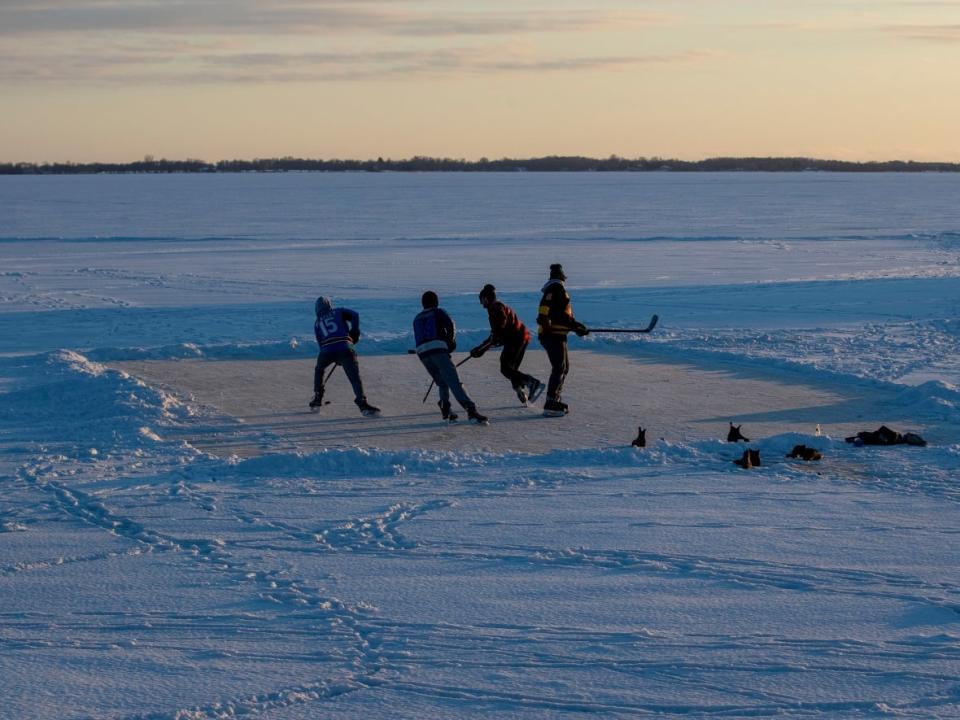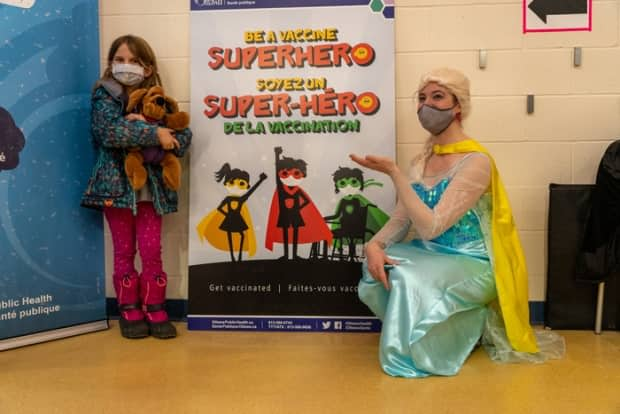What you need to know about COVID-19 in Ottawa on Friday, Jan. 28

Recent developments:
The City of Ottawa says residents should begin to expect "significant traffic and transit delays or disruptions" this weekend as convoys arrive to protest COVID-19 vaccine mandates. Ottawa's police chief says officials are on guard against "social media actors" and "lone wolves" who might try to infiltrate it.
One of the groups of drivers and their vehicles has arrived on Parliament Hill.
Ottawa Public Health reported six more COVID deaths Friday for 61 deaths this month, passing the 60 reported in May 2021 — the most in a month since COVID vaccines were approved.
Its COVID hospitalization count didn't change much from Thursday's update. Sixty per cent of Ottawa adults have now had a third vaccine dose.
Some downtown businesses are considering closing their doors, while others are rolling out the welcome mat. Some vaccine clinics in central Ottawa and Gatineau are closing because of the anticipated traffic problems.
Children age five to 11 who are moderately to severely immunocompromised should get a third dose of a COVID-19 vaccine, the National Advisory Committee on Immunization recommended on Friday. It's up to provinces to put that advice into action.
Unions are calling for the Ontario government to reverse a pandemic policy that allows hospital workers to return to work while infected with COVID-19 if a facility's staffing situation becomes dire.
Numbers to watch
Testing can't meet demand during the Omicron wave, meaning many people with COVID-19 won't be reflected in the case count. Hospitalizations and wastewater monitoring can help fill in some of the grey areas.
The average level of coronavirus in Ottawa's wastewater is slowly falling from a record high earlier this month. It's high and stable in Kingston.
There are 110 Ottawa residents in local hospitals for treatment of active COVID-19 as of Thursday's daily Ottawa Public Health (OPH) report. This number has been rising for most of this month.
Fifteen of these patients are in an ICU.
Ottawa-Gatineau area confirmed COVID-19 cases
This count also doesn't tell the entire hospital picture: as of Monday, there were 286 hospital patients with COVID in Ottawa, roughly split between those needing care for COVID and those in hospital for other reasons who happen to have COVID.
As of Friday, Ottawa has had 57,267 confirmed cases of COVID-19. There are 2,869 known active cases — a number that may actually be much higher — and 687 residents have died from the illness.
Local public health officials have reported more than 120,000 COVID-19 cases across eastern Ontario and western Quebec. The last case total update from the Eastern Ontario Health Unit was Jan. 14 as it makes reporting changes.
Outside of Ottawa, the wider region has about 180 COVID-19 hospitalizations, with about 35 of them needing intensive care. Those numbers have been relatively stable and don't include Hastings Prince Edward Public Health, which has instituted a different way of reporting.
In eastern Ontario outside of Ottawa, 322 people with COVID-19 have died. In western Quebec, the death toll is 260.
What are the rules?
Eastern Ontario:
The province's private gathering limits are five people indoors and 10 outside.
Indoor dining, gyms and museums are among the closures, while other businesses and religious services can reach 50 per cent capacity.
The province plans to roll back these rules in stages starting Monday, when most closed businesses can reopen, entertainment venues can serve food and drink and private gathering limits go back up. Some surgeries put on pause earlier this month can resume that day.
The step after that is planned for Feb. 21.
In-person learning is back.
The province's vaccine passport is required for many public places for people above 12 years and 12 weeks old. People can prove they've had at least two vaccine doses with a paper or digital document that has a QR code.
Western Quebec
Indoor gatherings involving more than one household bubble are generally prohibited. Restaurant dining rooms are closed, as are most places of worship. Indoor sports have also been cancelled.
As of Monday dining rooms can reopen at half capacity, those kinds of indoor gatherings can happen again and some youth sports can happen again.
Theatres and places of worship will be allowed to reopen as of Feb. 7. Its public health director says the timing of further changes depends on people getting vaccinated and keeping in-person contacts low.
Schools are reopen for in-person learning.
A vaccine passport is in place for most people age 13 and up in many public spaces. People can use an app or show paper proof they have at least two doses.
Quebec's health minister said earlier this month that people will eventually have to have three doses for the passport. The premier said people who remain unvaccinated without a medical exemption will have to pay a health tax.
What can I do?
Prevention
COVID-19 primarily spreads through droplets that can hang in the air. People can be contagious without symptoms, even after getting a vaccine.
Evidence suggests the dominant Omicron variant is more contagious than other types, but generally less deadly for vaccinated people without underlying conditions.
That level of spread puts vulnerable people at risk and is making staffing a challenge in many sectors, delaying many more medical procedures and increasing the workload of staff who aren't sick or isolating.
WATCH | Essential workers want to be paid more for current risks:
There are signs that COVID-19 spread during this pandemic wave may be plateauing at very high levels.
Health officials say people should recommit to the fundamentals of getting all vaccine doses as they're eligible for and staying home when sick. If people are going to have social visits, they should keep them small and do it outside if possible.
Masks, preferably medical ones, are mandatory in indoor public settings in Ontario and in Quebec for people age 10 and up. They're generally recommended in crowded outdoor areas.
Ontario and Quebec allow some people to self-isolate for just five days under certain circumstances.
Health Canada recommends older adults and people with underlying medical conditions get help with errands and have supplies in case they need to isolate.
WATCH | The proposed national changes to long-term care standards:
Mental health can also be affected by the pandemic, and resources are available to help.
Travel
Travellers older than 12 years and four months must be fully vaccinated to board a plane, train or marine vessel in Canada.
The federal government is officially advising against non-essential international travel.
People have to be fully vaccinated, pre-approved, asymptomatic and test negative to enter Canada.
There are limited exceptions.
The U.S. requires all adults crossing a land, air or water border to be fully vaccinated. People flying there will need proof of a negative COVID-19 test within a day of departure.
The hope is that other countries will accept provincial or territorial proof of vaccination.
Vaccines
Vaccines curb the spread of all variants of COVID-19 and go a long way toward avoiding deaths and hospitalizations, without offering total protection.
Four COVID-19 vaccines have been deemed safe and approved in Canada, with some age restrictions.
Both local provinces generally recommend doses for kids age five to 11 be given at least eight weeks apart for the best possible protection. Some health authorities say parents can request a shorter interval; the minimum time between doses is three weeks.

Guidance varies on when, not if, people should get a third dose after contracting COVID-19. Experts do agree people shouldn't get it until they're feeling recovered.
There have been more than 4.9 million first, second and third COVID-19 vaccine doses administered in the wider Ottawa-Gatineau region, which has about 2.3 million residents.
Eastern Ontario
Eligible people can look for provincial appointments online or over the phone at 1-833-943-3900.
Local health units have some flexibility, so check their websites for details. Many offer child-only clinics and limited walk-ins.
Everyone 18 and older in Ontario can book third shots once 84 days have passed since their second dose. Fourth doses are being offered to select groups after the same 84-day wait.
Pharmacies and some family doctors offer vaccines through their own booking systems.
Western Quebec
Those who are eligible can get an appointment or visit a permanent or mobile walk-in clinic.
All adults are eligible for a third dose; the general recommendation between second and third is three months.
Symptoms, treatment and testing
COVID-19 can range from a cold-like illness to a severe lung infection, with common symptoms including fever, a cough, headache, vomiting and loss of taste or smell.
"Long-haul" symptoms can last for months.
Health Canada has approved Pfizer's COVID-19 prescription treatment Paxlovid. Ontario and Quebec are using it at first on adults at risk of severe COVID-19 problems.
If you have severe symptoms, call 911.
In eastern Ontario:
Only high-risk people with symptoms or who are at risk of severe illness from COVID-19 can get a laboratory-checked PCR test due to Omicron demand.
Qualified people can check with their health unit for clinic locations and hours. Other people with symptoms should assume they have COVID-19 and isolate.
Only students and teachers who show symptoms at school will have access to PCR tests. Rapid and take-home tests are available in some child-care settings when risk is high.
Ottawa's COVID-19 testing task force says there won't be any more take-home PCR tests available from schools once the current supply runs out.
Travellers who need a test have local options to pay for one.
In western Quebec:
Quebec has also stopped giving PCR tests to the general public.
PCR tests will be reserved for those in high-risk settings such as hospitals, long-term care homes, detention centres and homeless shelters.
Rapid COVID-19 tests are available in all Quebec daycares, preschools and elementary schools, as well as through pharmacies for the general population.
The online portal where people can report rapid test results is now online.
First Nations, Inuit and Métis:
First Nations, Inuit and Métis people, or someone travelling to work in a remote Indigenous community, are eligible for a test in both Ontario and Quebec.
Akwesasne has COVID-19 test and vaccine information online or at 613-575-2341. Residents can contact its Community in Quarantine Program if they need help getting essentials while isolating.
The neighbouring Saint Regis Mohawk Tribe is also offering tests.
It has had more than 1,700 residents test positive for COVID-19 and has reported 18 deaths between its northern and southern sections.
People in Kitigan Zibi Anishinabeg can call the health centre at 819-449-5593 for a test or vaccine; email is another option for vaccine booking. Ode Widokazowin can help people in isolation get groceries at 819-449-2323.
It had more than 150 confirmed cases and one death as of mid-January, and 137 of those cases are since Dec. 3, 2021.
People in Pikwàkanagàn can call a COVID-19 hotline at 613-401-0428 for updates on its response. It's offering PCR tests four mornings a week.
The community didn't have any confirmed COVID-19 cases until December 2021; it had 61 confirmed cases as of Jan. 21.
Anyone in Tyendinaga who's interested in a test can call its community health team at 613-967-3603, text it at 613-686-5510 or send it an email. It had 91 confirmed cases and two deaths until it paused sharing its count in early January 2022.
Inuit in Ottawa can call the Akausivik Inuit Family Health Team at 613-740-0999 for service, including testing and vaccines, in Inuktitut or English on weekdays.

 Yahoo Movies
Yahoo Movies 